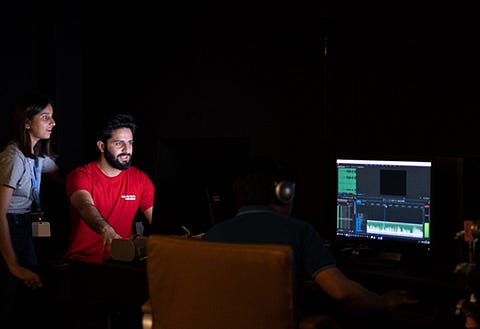
The most obvious assumption, when asked about what a film producer does, is that he/she is the money man/woman, who handles the financial aspects of filmmaking. A producer, however, is so much more. Often termed the owner of the ship (with the director being the captain), the producer has final responsibility in a film project. While managing the finances is undoubtedly a huge part of their job, the producer also needs to be able to think creatively. Since there are usually a lot of misconceptions about the role of a film producer, we thought we’d clear the air. If a career in producing films catches your fancy, read on to know about just what is expected from you!
1. As a producer, you will be involved in the filmmaking process right from the very beginning. At the ideation stage, your work involves purchasing and developing ideas. Often, the responsibility of securing the IPR (Intellectual Property Right) too lies with the producer.2. Once the project gets approved, you are now responsible for hiring and managing the core creative team that may include writers, director, director of photography, actors and other heads of departments.
3. As the film nears development, the producer supervises the writer regarding the final script.
4. Once the approvals for the script are in place, the producer must come up with the estimated budget and look for sources of funding which can come through various sources; studios, private investors, bank finance or personal funds.
5. Once the finances are in place, the producer must ensure that the project stays within budget. They also must ensure that the project stays within the creative as per the planned treatment.
6. The producer also must work closely with the director in scouting locations, deciding upon the special effects for the film, as well as reviewing the film that is shot on a daily basis.
7. Time is money, keeping that in mind the producer must make sure the project is completed as per the planned schedule.
8. In the post-production stage, the producer must oversee the editing, music composition, sound design, visual effects and colour grading.
9. Once the film is completed, the producer is responsible for procuring the desired deliverables as per the scope of the project. For example, for a theatrical release, that would be a DCP (digital cinema package).
10. Finalise the order and scenes that will make it into the final cut along with the director, and once the final cut is ready, the producer must review it.
11. The producer is also involved with Publicity and Advertising. They need to ensure that a buzz exists about the film among the general public.
12. As a final task, the producer’s final task will have to work in tandem with a distributor to secure distribution rights for the film. They must consult with distribution companies and studios to reach out to the audience. The distributors will then take the movie to the exhibitors if it’s a theatrical release.
Reference Links:
www.nfi.edu/foley-artist
www.sound-ideas.com/Page/what-is-foley
www.studiobinder.com/blog/what-is-a-foley-artist
www.nfi.edu/foley-artist
www.sound-ideas.com/Page/what-is-foley
www.studiobinder.com/blog/what-is-a-foley-artist


